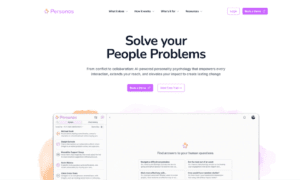Lead generation is the process of attracting and converting strangers into potential customers.
It’s a critical part of any business’s marketing strategy, and it’s one that can be greatly influenced by psychology.
In this blog post, we’ll explore some of the key psychological principles that can help you persuade visitors to take action on your lead-generation campaigns.
We’ll look at how to use social proof, reciprocity, authority, scarcity, and other principles to create more persuasive and effective lead-generation campaigns.
Social Proof
Social proof is the idea that people are more likely to do something if they see that other people are doing it. This is a powerful psychological principle that can be used to great effect in lead generation.
For example, you could include testimonials from satisfied customers on your website or landing pages.
This would help to show potential customers that other people have had positive experiences with your business, and it would make them more likely to want to do business with you as well.
Reciprocity:
The reciprocity principle states that people are more likely to do something for you if you’ve done something for them first.
This is why it’s a good idea to offer something of value to visitors in exchange for their contact information.
For example, you could use ready-made AI-powered apps to offer free value in exchange for your visitor’s email address. These lead magnets are optimized to generate leads on autopilot.
Apps like Business Ideas Generator, SEO Blog Generator, and Email Subject Line Generator are great examples of tiny tools people want to use for free.
It helps you to build trust and rapport with visitors, and it would make them more likely to take action.
Authority:
People are more likely to trust and be persuaded by people they perceive as being experts or authorities in their field.
This is why it’s important to establish yourself as an authority in your industry if you want to be successful at lead generation.
There are a number of ways to do this. You could write blog posts or articles on industry-related topics, speak at industry events, or even get certified in your field.
By establishing yourself as an authority, you’ll be more likely to persuade visitors to take action on your lead generation campaigns.
Scarcity:
The scarcity principle states that people are more likely to want something if they believe that it’s scarce or in limited supply. This is why limited-time offers and discounts are so effective at generating leads.
When people see that something is scarce, they’re more likely to feel a sense of urgency and take action. This is because they don’t want to miss out on the opportunity.
Other Psychological Principles:
In addition to the four principles we’ve discussed, there are a number of other psychological principles that can be used to persuade visitors to take action on your lead generation campaigns. These include:
The Power of Storytelling:
One powerful psychological tool that can greatly impact lead generation is storytelling. Humans are naturally drawn to stories as they create emotional connections and engage our minds on a deeper level.
When crafting your lead generation campaigns, consider incorporating compelling narratives that showcase how your product or service has positively impacted the lives of others.
These stories could be in the form of case studies, customer success stories, or even personal anecdotes.
By sharing these stories, you appeal to your visitors’ emotions and make your brand more relatable and trustworthy.
Cognitive Biases in Lead Generation:
Cognitive biases are inherent thinking patterns that influence how we perceive information and make decisions. Understanding these biases can help you tailor your lead-generation campaigns to be more effective.
For example, the anchoring bias suggests that people tend to rely heavily on the first piece of information they receive. Use this to your advantage by presenting the most attractive offer or value proposition upfront.
Another cognitive bias, the bandwagon effect, states that people are more likely to adopt a belief or take action if they see others doing the same.
You can leverage this bias by displaying real-time notifications of recent sign-ups or purchases, creating a sense of FOMO (fear of missing out) for your visitors.
Personalization and Lead Generation:
Personalization is a critical aspect of successful lead generation. When visitors feel like the content or offers are specifically tailored to their needs and preferences, they are more likely to engage and convert.
Utilize data-driven approaches to gather information about your visitors, such as their browsing behavior, location, or previous interactions with your brand.
With this data, you can create personalized lead magnets, product recommendations, or even personalized email campaigns.
Building Trust and Credibility:
Trust is paramount in lead generation. If visitors don’t trust your brand, they are unlikely to provide their contact information or consider making a purchase.
One effective way to build trust is through transparency. Be open about your business practices, customer reviews, and any potential drawbacks of your products or services.
This honesty will be appreciated by your audience and enhance your credibility
Additionally, displaying trust signals such as security badges, industry certifications, or partnership logos can reinforce your authority and reliability in the eyes of visitors.
Testimonials and reviews from reputable sources or well-known personalities also contribute to building trust.
Overcoming Decision Paralysis:
Too many choices can overwhelm visitors, leading to decision paralysis, where they fail to take any action at all.
To counter this, simplify your lead generation process by providing clear and concise options. Limit the number of form fields or steps required to sign up for your offer.
Implementing a progress bar during the sign-up process can also make it feel more manageable and encourage visitors to complete the action.
Conclusion:
Mastering the psychology of lead generation is an ongoing process that requires an understanding of human behavior and decision-making.
By incorporating social proof, reciprocity, authority, scarcity, storytelling, and personalization, you can create persuasive and effective lead-generation campaigns.
Building trust, appealing to cognitive biases, simplifying choices, and conducting A/B testing will further enhance the impact of your efforts.
Remember that successful lead generation goes beyond capturing contact information; it involves nurturing relationships and guiding potential customers through their buying journey.
By combining psychological principles with continuous optimization, you can create a robust lead generation strategy that drives long-term success for your business.



































